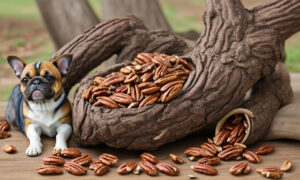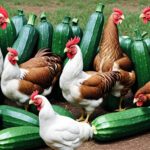When it comes to raising chickens, one of the joys for many owners is watching their feathered friends enjoying a variety of treats. Chickens are known for their voracious appetites and seem to take delight in pecking at anything remotely edible. Among the plethora of garden delights, tomatoes often come to mind as a nutritious option. But can chickens eat tomatoes safely? This question has perplexed many poultry enthusiasts. As a provider of high-quality organic produce, we’re here to dive deep into the surprising truth behind chickens and tomatoes, giving you all the information needed to ensure your flock’s wellbeing.
Understanding Chicken Diets: The Basics
Before delving into the specifics of tomatoes in a chicken’s diet, it’s crucial to understand what constitutes a healthy and balanced diet for our avian companions. Chickens are omnivores, which means they thrive on a diet consisting of both plant and animal-based foods.
What Do Chickens Normally Eat?
- Grains: Typically, a chicken’s diet is grain-based, often in the form of commercial feed that is carefully formulated to provide all the necessary nutrients.
- Bugs and Insects: They also enjoy a variety of bugs, worms, and insects they forage, which provide protein.
- Fruits and Vegetables: Chickens will happily peck at most fruits and vegetables they come across, turning them into valuable sources of vitamins and minerals.
Related Post; Can chicken eat zucchini
Can Chickens Safely Eat Tomatoes? The Mixed Answer
Now comes the main question: can chickens have tomatoes? The answer isn’t straightforward. To understand the complexities of tomatoes as a part of your chickens’ diet, we need to delve into the specifics of what tomatoes are made of and what parts are safe for chickens.
Nutritional Composition of Tomatoes
Tomatoes are rich in:
- Vitamins: Especially vitamin C and A.
- Antioxidants: Including lycopene, which not only gives tomatoes their characteristic red color but also has various health benefits.
- Water Content: Helping to keep chickens hydrated, particularly in hot weather.
Despite these beneficial aspects, there’s more to tomatoes that we need to recognize.
The Risks of Tomato Plants to Chickens
Tomato plants are a part of the nightshade family and contain substances called solanine and tomatine, which are potentially toxic. While the ripe tomato fruit contains these compounds in lower levels, the leaves, stems, and green unripe tomatoes carry higher concentrations and can be harmful to chickens.
The Do’s and Don’ts of Feeding Tomatoes to Chickens
Understanding the potential risks can guide us in establishing safe feeding practices. Here is a breakdown of what to consider when offering tomatoes to your flock.
The Dos:
- Offer ripe tomatoes: Make sure they are red and mature as they contain less tomatine and solanine.
- Wash the tomatoes: To remove any pesticides or chemicals that may be on the skin.
- Cut them into peckable pieces: To make it easier for chickens to ingest.
The Don’ts:
- Avoid green, unripe tomatoes and any part of the tomato plant.
- Do not make tomatoes the main part of their diet; it should be an occasional treat.
- Never provide moldy or rotten tomatoes, as these can contain toxins harmful to chickens.
How Frequently Can Chickens Have Tomatoes?
Chickens can have tomatoes, but moderation is key. These fruits should be given as a supplementary treat rather than a staple of their diet. A good rule of thumb is the “90/10” rule, where 90% of a chicken’s diet comes from their main feed and the remaining 10% from treats like tomatoes.
Portion Control for Chicken Treats
What Constitutes a Treat Portion?
- A small cherry tomato per chicken or a slice of a larger tomato is enough.
- Treats should be distributed in a manner that doesn’t disrupt the flock’s regular feeding routine.
Integrating Tomatoes into Your Chicken’s Diet: Best Practices
In addition to the frequency and portion size, there are best practices to consider when feeding your chickens tomatoes.
Balanced Feeding Techniques
- Mix tomatoes with other safe fruits and vegetables to provide variety.
- Always pair treat sessions with plenty of fresh water for your chickens to drink.
Ensuring Safety and Health:
- Monitor your flock after giving them tomatoes as treats for any signs of distress or unusual behavior.
- Keep the coop and run area clean from any leftover food to prevent attracting pests or causing health issues.
Troubleshooting: Common Concerns with Chickens and Tomatoes
Even with precautions, you may run into some issues or have concerns when feeding tomatoes to your flock.
Signs of Tomato Plant Toxicity
If chickens ingest parts of the tomato plant, they might exhibit:
- Lethargy
- Reduced appetite
- Respiratory distress
Should you notice these symptoms, contacting a veterinarian specialized in poultry is essential.
Myths vs. Facts: Can Chickens Eat Tomatoes?
Myth: All parts of the tomato are toxic to chickens.
Fact: Mature, ripe tomato fruits are typically safe in moderation.
Myth: Feeding chickens tomatoes will make their eggs taste funny.
Fact: There’s little evidence to support this claim. The flavor of eggs is more so affected by the main feed than by occasional treats.
What Other Foods Are Safe for Chickens?
To complement their diet, here are other safe foods you can feed your chickens:
- Cucumbers
- Leafy greens like lettuce and kale
- Cooked beans (never raw)
- Cooked grains like rice and oatmeal
However, always do your research or consult with a vet before introducing new foods into your chickens’ diet.
Conclusion: The Verdict on Chickens and Tomatoes
In conclusion, chickens can have tomatoes, but there are nuances to this seemingly simple question. The key takeaways to remember for a happy, healthy flock include offering ripe tomatoes in moderation, avoiding the green parts of the plant, and ensuring a balanced diet. By adhering to this guideline, you can indulge your chickens’ taste buds without compromising their health.







